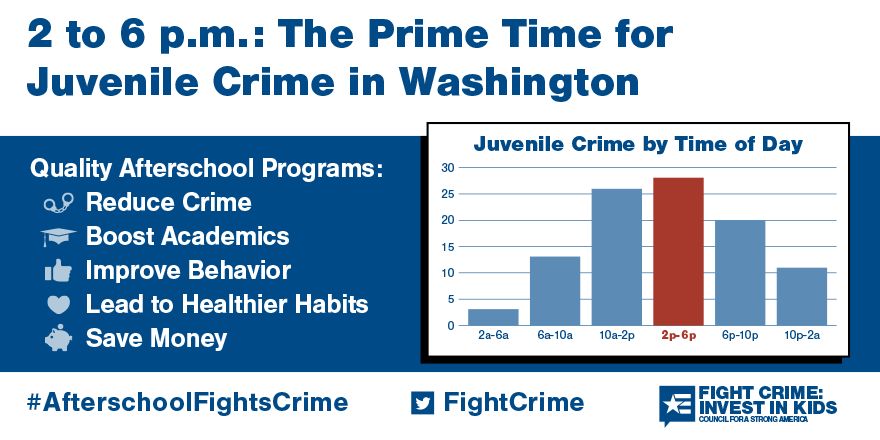After School: Still the Prime Time for Juvenile Crime in Washington
Afterschool Fights Crime in Washington
Related
The more than 5,000 law enforcement leaders around the nation who are members of Fight Crime: Invest in Kids, have long known that the hours immediately after school lets out, when parents are likely not available to supervise, are the prime-time for juvenile crime. Over the past 20 years, law enforcement leaders across the country have relied on high-quality afterschool programs to provide supportive, stable, and enriching environments with caring adults that keep children and youth out of trouble and safe, while supporting their academic success, and social and emotional development.
The Prime Time for Juvenile Crime in Washington

In Washington, juvenile crime peaks from 2 to 6 p.m. on school days, with about 28 percent of all juvenile crime on those days occurring during the hours following the last school bell.
Program Highlight: Police Activity League, Spokane
Expanded learning opportunities not only provide experiences for students to learn and grow, but can support critical relationship building between youth and law enforcement. Spokane Police Activity League (PAL) launched in 2013 and expanded in 2015 in response to the mistrust between the police department and community members, especially youth. A summer program was created in partnership with Spokane Public Schools where school-age children can participate in STEM learning and sports while building positive self-identity and stronger relationships with local police.

Spokane PAL programs take a holistic approach to crime prevention. The object of this program is to engage potential at-risk youth with positive athletic, academic, and community service programs that will secure their path to a successful, healthy, and prosperous adulthood. Spokane PAL’s programs focus on mentorship and reducing drug and gang involvement by centering the work around five core values: respect, honesty, sportsmanship, integrity, and leadership.
Download the Graphic
Read More About
States
